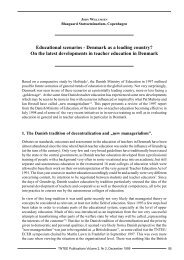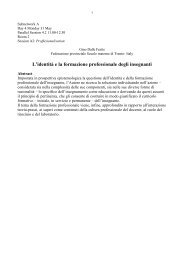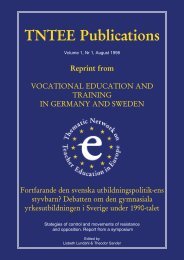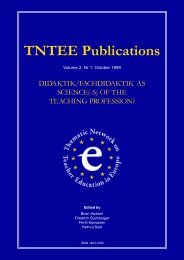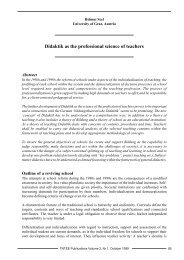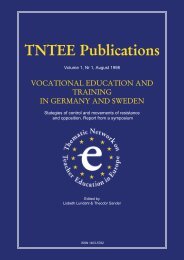Didaktik/Fachdidaktik as Science(-s) of the Teaching ... - tntee
Didaktik/Fachdidaktik as Science(-s) of the Teaching ... - tntee
Didaktik/Fachdidaktik as Science(-s) of the Teaching ... - tntee
- TAGS
- teaching
- tntee
- tntee.umu.se
You also want an ePaper? Increase the reach of your titles
YUMPU automatically turns print PDFs into web optimized ePapers that Google loves.
68<br />
<strong>Didaktik</strong>/fachdidaktik <strong>as</strong> integrative transformation science(-s)<br />
both at schools and in TE. Additionally, this subnetwork explores <strong>the</strong> potential <strong>of</strong> <strong>Didaktik</strong>/<br />
<strong>Fachdidaktik</strong> to become a science for <strong>the</strong> teaching pr<strong>of</strong>ession. So far, this subnetwork, consisting <strong>of</strong><br />
experts from different academic disciplines and coming from 11 European Economic Area Member<br />
States, h<strong>as</strong> published a heterogeneous collection <strong>of</strong> more than 20 publications on its topic. This<br />
chapter may be seen in relationship to ongoing work <strong>of</strong> <strong>the</strong> subnetwork mentioned. It is both a<br />
modified and enlarged version <strong>of</strong> <strong>the</strong> publications “Scientific b<strong>as</strong>es <strong>of</strong> initial teacher education and<br />
<strong>the</strong>ir relevance to evaluate it – between <strong>the</strong> state <strong>of</strong> practice and <strong>the</strong> state <strong>of</strong> <strong>the</strong> art” (Buchberger<br />
1998c) and “<strong>Didaktik</strong>/<strong>Fachdidaktik</strong> <strong>as</strong> science(-s) <strong>of</strong> <strong>the</strong> teaching pr<strong>of</strong>ession?” (Buchberger and<br />
Buchberger 1998).<br />
Introduction<br />
Ironically, one might state that education and training have incre<strong>as</strong>ingly become big super-markets.<br />
Education policy – <strong>as</strong> well <strong>as</strong> social policy – and economic policy documents unanimously stress<br />
<strong>the</strong> necessity <strong>of</strong> human resource development and <strong>of</strong> high quality education and training for all (cf.<br />
European Commission 1995, 1997, OECD 1996, 1998). It is argued that <strong>the</strong> prosperity <strong>of</strong> postindustrial<br />
information and knowledge driven societies would depend on <strong>the</strong> optimal development<br />
(and exploitation) <strong>of</strong> <strong>the</strong> human capital <strong>of</strong> all its citizens and that <strong>the</strong>se societies had “to transform<br />
<strong>the</strong>mselves into dynamic learning societies” (OECD 1996). Substantial reforms <strong>of</strong> education and<br />
training are perceived to be indispensable. Focussing on traditional “more <strong>of</strong> <strong>the</strong> same – rationales”<br />
(modification – and adaptation strategies) to improve or to make education and training more efficient<br />
is perceived <strong>as</strong> inappropriate (OECD 1996) considering <strong>the</strong> amount <strong>of</strong> problems persisting and <strong>the</strong><br />
rapidly changed/changing contexts (e.g. “globalization”, cf. Amin 1997, Beck 1997) and conditions<br />
(e.g. <strong>the</strong> multimedia revolution, cf. Tella 1998) <strong>of</strong> and expectations <strong>of</strong> education and training.<br />
Policy documents frequently stress <strong>the</strong> important role education and training establishments, teachers<br />
and <strong>the</strong>ir education had to play to meet <strong>the</strong>se challenges adequately and to realize education and<br />
training reforms perceived to be necessary. H. Judge (1998, vii) h<strong>as</strong> described <strong>the</strong> status quo <strong>of</strong><br />
education reform and <strong>the</strong> role <strong>of</strong> teacher education (TE) in <strong>the</strong> United States in his foreword to <strong>the</strong><br />
evaluation report on <strong>the</strong> Holmes Commission/Partnership activities (cf. Fullan et al. 1998) <strong>as</strong> follows:<br />
“The most salient change since 1986 h<strong>as</strong> without doubt been <strong>the</strong> installation <strong>of</strong> teacher education<br />
reform at or near <strong>the</strong> head <strong>of</strong> every agenda for educational regeneration: a hi<strong>the</strong>rto neglected or<br />
subordinate <strong>the</strong>me h<strong>as</strong> become dominant. Just <strong>as</strong> it h<strong>as</strong> emerged <strong>as</strong> a commonplace that reform<br />
cannot be achieved without good teachers, so it h<strong>as</strong> become axiomatic that good teachers need and<br />
deserve a first-cl<strong>as</strong>s preparation”. But, at <strong>the</strong> same time J. Sikula (1996) h<strong>as</strong> stated in his introduction<br />
to <strong>the</strong> second edition <strong>of</strong> <strong>the</strong> “Handbook <strong>of</strong> Research on Teacher Education” that schooling and<br />
teacher preparation have not been high priority issues in American education policy yet. 1<br />
Parallel with developments in <strong>the</strong> United States, policy documents <strong>of</strong> <strong>the</strong> European Commission<br />
stress <strong>the</strong> importance <strong>of</strong> high quality education and training for all and <strong>the</strong> role teachers and TE<br />
ought to play. “Quality” 2 <strong>of</strong> education and training in general and <strong>of</strong> TE in particular had to be<br />
improved. Reforms <strong>of</strong> TE perceived to be indispensable had to relate to aims and objectives, contents<br />
and learning are<strong>as</strong>, teaching/learning strategies and learning environments <strong>as</strong> well <strong>as</strong> to administration<br />
and governance issues. However, coherent action cannot always be detected – both at European<br />
Commission level and at <strong>the</strong> level <strong>of</strong> <strong>the</strong> different Member States <strong>of</strong> <strong>the</strong> European Union. Despite<br />
rhetorical agreement on education and training reform in general and TE reform in particular being<br />
indispensable for education reform, nei<strong>the</strong>r rank top on <strong>the</strong> political agenda <strong>of</strong> <strong>the</strong> European<br />
Commission nor on those <strong>of</strong> most <strong>of</strong> its Member States (cf. Buchberger 1998a, b).<br />
TNTEE Publications Volume 2, Nr 1, October 1999



